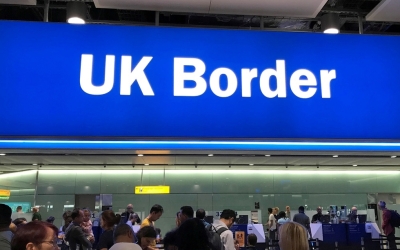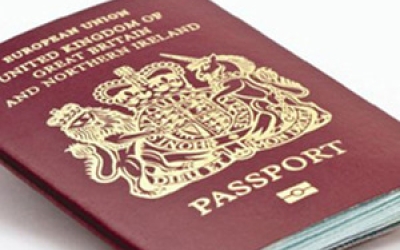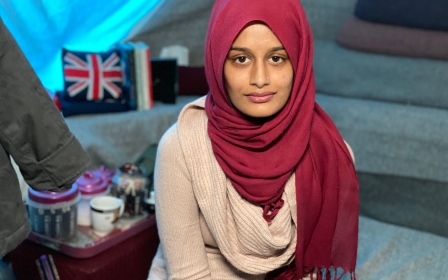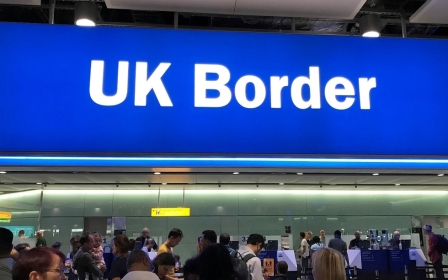UK court restores citizenship to three British-Bangladeshis who travelled to Syria
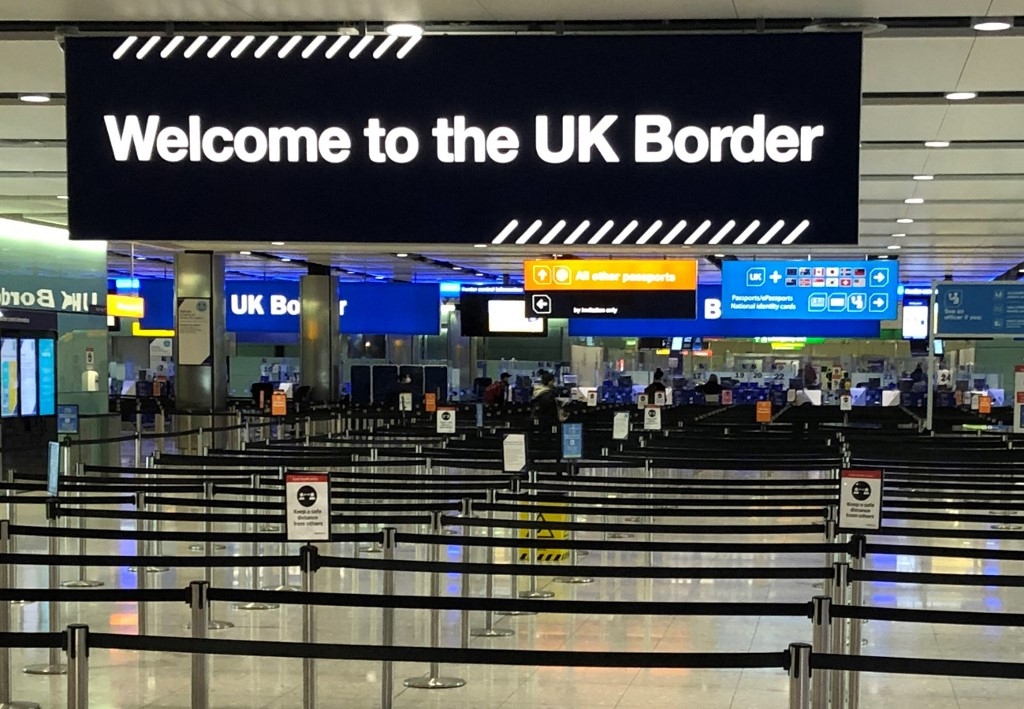
A court in London has restored the UK citizenship of three British nationals of Bangladeshi background in the latest legal battle over the government's use of controversial powers against people who travelled to Syria.
In a judgment on Thursday, the Special Immigration Appeals Commission (SIAC) ruled that Home Secretary Priti Patel's decision to revoke the citizenships of two women and one man, known as C3, C4 and C7, had left them stateless because they did not hold Bangladeshi citizenship.
The judgment follows previous rulings by SIAC that determined that British nationals entitled to Bangladeshi citizenship had forfeited that right if they had not taken action to claim it by the age of 21.
The government has previously sought to appeal such rulings. In 2019, the Court of Appeal ordered SIAC to look again at the case of two men, E3 and N3, whose loss of citizenship it had overturned on the grounds that they were not Bangladeshi nationals, because of an “error in law”.
E3 and N3 are currently waiting to learn whether they will be allowed to challenge that judgment in the Supreme Court.
The two women, C3 and C4, both born in the UK, were deprived of their citizenship in November 2019 at the age of 29 and 27. The man, C7, who was born in Bangladesh in 1978 but was a British citizen by birth, was deprived of his citizenship in March 2020.
“C3, C4 and C7 have persuaded us that, on the dates when the decisions and the orders in their cases were made, they were not nationals of Bangladesh or any other state apart from the UK,” the judgment concluded.
“This means that orders depriving them of their British citizenship would make them stateless. The secretary of state had no power to make orders with that effect. For that reason – and that reason alone – the appeals against the decisions to make those orders succeed.”
The cases involving British citizens of Bangladeshi heritage have hinged on interpretations and nuances of Bangladeshi nationality law, with judges even considering the meaning, and active or passive nature, of Bengali verbs.
Referring to one document in Bengali, they conceded that interpretation was difficult "because none of the Commission's members speak or read Bangla [Bengali]. There are different translations and the experts do not agree on which of them is the most accurate".
In the C3, C4 and C7 cases, the appellants accused the government of an "abuse of process" because it had attempted to re-argue points determined in previous SIAC cases by appointing a new expert witness.
SIAC judges rejected this, finding that there had been "nothing... that could properly be characterised as an abuse of the Commission's process".
Still, they said they considered the appellants' expert witness, Ridwanul Hoque, a professor of law at the University of Dhaka who had also been used as a witness in previous SIAC hearings, to be a "safer guide" to the issues of the case.
The UK government has used citizenship-stripping powers extensively against British nationals who travelled to Syria since the start of the country's civil war in 2011, citing national security grounds.
Those targeted include people suspected of travelling to join the Islamic State group, some of whom are now being held in camps in northeastern Syria, and people involved in aid work in opposition-held Idlib province in the northwest.
'Extremely disappointed'
The most high-profile case involves Shamima Begum, another British-Bangladeshi woman currently stranded in the Kurdish-controlled al-Roj camp.
Unlike C3, C4 and C7, Begum, who travelled to Syria aged 15, was under the age of 21 when she was deprived of her citizenship, and so was still considered by SIAC to have a right to Bangladeshi citizenship.
The UK and citizenship-stripping powers
+ Show - HideThe UK has been described by researchers as a “global leader in using citizenship deprivation as a counterterrorism measure”.
Historic citizenship-stripping powers targeted at naturalised citizens on disloyalty grounds had largely fallen into disuse prior to 2002, when the government introduced new measures in an attempt to revoke the citizenship of Abu Hamza, an Egyptian-born cleric subsequently convicted of terrorism in the US.
The 2002 legislation allowed for British-born nationals as well as naturalised citizens to lose their nationality rights. Successive governments gradually broadened the scope of the powers so that home secretaries can now deprive anyone of citizenship if they are satisfied that doing so is “conducive to the public good” and would not leave an individual stateless.
No criminal conviction is required. Letters often state that individuals have been assessed as presenting “a risk to the national security of the United Kingdom”.
The government’s use of the powers surged to unprecedented levels in response to the perceived threat posed by British nationals returning from Syria.
Between 2010 and 2015, 33 people were stripped of their citizenship, according to Home Office figures. In 2016, 14 people were deprived, and in 2017 the number jumped to 104.
In 2018, the figure was 21, and in in 2019 - when Shamima Begum was among those targeted - it was 27. It then dropped to ten in 2020 and eight in 2021.
Some subjects of citizenship-stripping orders argue that they have been left effectively stateless, because the government bases its assessment that they are dual nationals on a right of citizenship to a parent’s country of birth, even if they have never taken up that citizenship or even visited the country.
In some cases the Special Immigration Appeals Commission, which rules on citizenship cases, has agreed: it has ruled in favour of British nationals of Bangladeshi descent on the grounds that Bangladesh does not consider them citizens if they have not claimed Bangladeshi nationality before the age of 21.
Human rights organisations and lawyers have compared the powers to “medieval exile and banishment”. Critics also point out that the powers create a two-tier system in which only those deemed to be dual nationals are at risk of losing their British citizenship; a measure that discriminates against naturalised citizens, immigrants and their children.
Last month the Supreme Court overturned a Court of Appeal ruling ordering the government to allow Begum to return home to challenge the loss of her citizenship in person.
It said the Court of Appeal's ruling that Begum's right to a fair hearing should prevail over the government's argument that she posed a national security threat was “mistaken”.
'This ruling confirms that in the home secretary’s rush to abdicate responsibility for these women, she broke domestic and international law by rendering them stateless'
- Maya Foa, Reprieve
Thursday's judgment was welcomed by human rights campaigners who have called on the UK government to repatriate its own nationals being held in Syrian camps.
“This ruling confirms that in the home secretary’s rush to abdicate responsibility for these women, she broke domestic and international law by rendering them stateless," said Maya Foa, director of Reprieve.
Foa said that many people from the UK being held in Syria may fit the definition of “trafficked persons”.
“The government was wrong to remove citizenship from these women. Now that it has been restored, the government should repatriate them so that the British justice system can address the full complexity of their cases, including the real possibility they are victims of trafficking.”
A spokesperson said the Home Office was “extremely disappointed” by the judgment.
Middle East Eye delivers independent and unrivalled coverage and analysis of the Middle East, North Africa and beyond. To learn more about republishing this content and the associated fees, please fill out this form. More about MEE can be found here.


